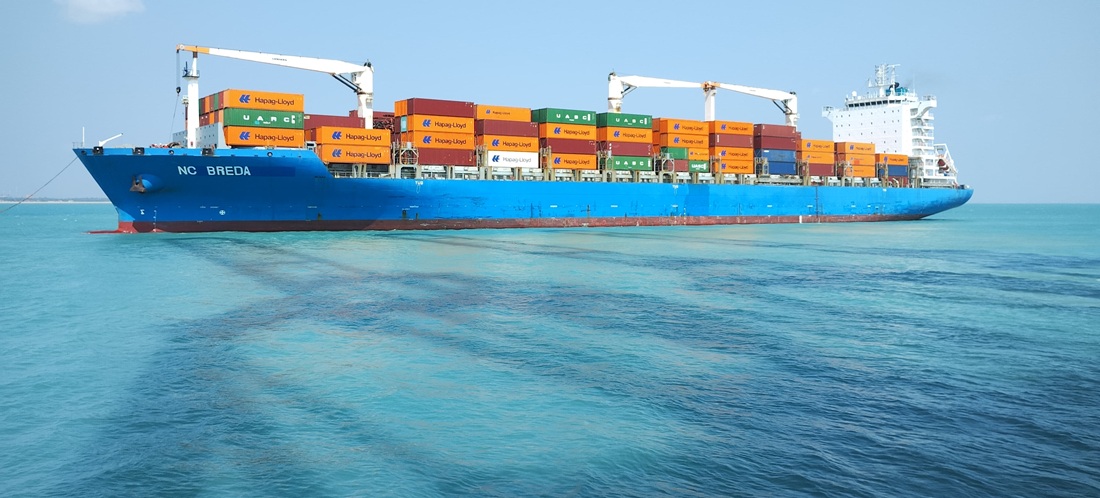
Norcoast Achieves 20% Market Share in Its First Year of Operation.
Mar, 28, 2025 Posted by Denise VileraWeek 202512
Norcoast, a Brazilian coastal shipping company, has completed its first year of operations with a 20% market share in the ports it serves and a portfolio of over 400 active and recurring customers. The company moved more than 70,000 TEUs during this period, with 60% of the volume transported via door-to-door service. Demonstrating solid growth in line with its business plan, Norcoast aims to reach operational maturity by 2027.
Operating since February 2024, the company has shown impressive growth in the market and projects a monthly volume of 14,000 TEUs. Always exploring new opportunities, Norcoast seeks to expand its market reach and increase its market share. Additionally, the company plans to hire new employees to support its growing national presence.
“Our purpose goes beyond optimizing logistics. Everyday, we strive to rethink how we integrate different transport modes, creating efficient deliveries for our customers and a cleaner future. We believe coastal shipping is more than just a logistics decision—it is a conscious choice for a more efficient alternative that connects, integrates, and transforms,” says Fabiano Lorenzi, CEO of Norcoast.
Operating from the North to the South of Brazil, Norcoast has quickly gained a strong market position by establishing key partnerships with port terminals. Currently serving six ports—Paranaguá (PR), Itajaí (SC), Santos (SP), Suape (PE), Pecém (CE), and Manaus (AM)—the company operates four vessels, each with a capacity of 3,500 TEUs, flying the Brazilian flag with a fully Brazilian crew.
“We received a high score on our first NPS (Net Promoter Score). This brings greater responsibility and demonstrates our commitment to offering our customers a consistent and integrated service,” Lorenzi adds.
A New Player in the Coastal Shipping Market
Recognized as an important player in the cabotage sector, Norcoast was launched in October 2023 as the first new entrant in the segment in 20 years. With a robust infrastructure and multimodal integration, the joint venture was founded by Hapag-Lloyd and Norsul to bring innovation and freedom of choice to companies already using coastal shipping and, more importantly, provide access to those that have yet to adopt this transport mode.
Norcoast invested heavily in market research, strategically mapping industries and identifying unmet demand. At the same time, it focused on brand development to raise awareness through communication channels and media outreach.
Today, the company offers cabotage and feeder container services along the entire Brazilian coast, catering to large shippers and businesses in the early stages of adopting coastal navigation. Its customer base includes food industries transporting large volumes of refrigerated animal protein, companies supplying raw materials for the construction sector, and brands distributing various consumer goods such as home appliances and electronics.
Cabotage as a Sustainable Transport Solution
With more than 8,000 kilometers of coastline, Brazil has significant potential for coastal cargo transport. Beyond transforming the national economy, this mode of transportation is sustainable, emitting four times less CO² than road transport.
Currently, 58 companies operate in the coastal shipping sector. Eleven has a fleet of 99 vessels that collectively transport 2.5 million tons. Available to businesses of all sizes, cabotage reduces highway congestion, lowers accident rates, and drives economic growth nationwide.
According to Fabian Lavaselli, Norcoast’s Commercial and Customer Experience Director, cabotage presents a clear opportunity to align Brazil’s transportation model with its natural advantages. “In the coming years, we will see the modernization and expansion of ports, increasing interconnectivity between different transport modes and facilitating the movement of goods across Brazil. However, for this transformation to truly happen, we need a fundamental shift in mindset. Decision-makers must view coastal shipping as a strategic ally,” Lavaselli concludes.
-
Automotive
Jun, 08, 2019
0
Anfavea reports 3.1% increase in auto sales in May
-
Economy
Dec, 19, 2023
0
Brazil announces trade, diplomatic wins with Egypt and Ethiopia
-
Economy
Apr, 30, 2020
0
25% rise in exports to China helps soften the coronavirus pandemic’s impact on Brazil’s economy
-
Ports and Terminals
Jun, 08, 2021
0
Indefinite fiscal regime affects port projects

